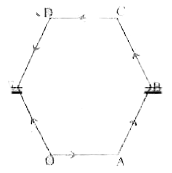If either →a=→0 or →a×→b=→0 .Is the converse true? Justify your answer with an example.Solution in Tamil
The correct Answer is:(∵R2 and R3 are proportional)
Step by step video, text & image solution for If either vec a = vec 0 or vec a xx vec b = vec 0 .Is the converse true? Justify your answer with an example. by Maths experts to help you in doubts & scoring excellent marks in Class 12 exams.
Updated on:21/07/2023Topper's Solved these Questions
- VECTOR ALGEBRABOOK - NEW JOYTHI PUBLICATIONCHAPTER - VECTOR ALGEBRAEXERCISE - ADDITIONAL QUESTIONS FOR PRACTICE 10.1
2 Videos
- VECTOR ALGEBRABOOK - NEW JOYTHI PUBLICATIONCHAPTER - VECTOR ALGEBRAEXERCISE - ADDITIONAL QUESTIONS FOR PRACTICE 10.2
13 Videos
- VECTOR ALGEBRABOOK - NEW JOYTHI PUBLICATIONCHAPTER - VECTOR ALGEBRAEXERCISE - SOLUTIONS TO NCERT TEXT BOOK EXERCISE 10.3
18 Videos
- TRIGONOMETRIC FUNCTIONSBOOK - NEW JOYTHI PUBLICATIONCHAPTER - TRIGONOMETRIC FUNCTIONSEXERCISE - QUESTIONS FROM COMPETITIVE EXAMS
134 Videos
Similar Questions
In the figure which vectors are
(i) equal (ii) collinear (iii) coinitial

View SolutionCompute the magnitude of the following vectors and identify the unit vector.
→a=2ˆi−3ˆj+5ˆk
View SolutionFind the angle between two vectors →a and →b with magnitudes √3 and 2, respectivey having →a.→b=√6.
View SolutionIf A+B+C=90∘ then
cotA+cotB+cotCcotAcotBcotC =
View SolutionIf either →a=0and →b=0then →a×→b=0. Is Is the converse true? Justify your answer with an example.
View SolutionIf either →a=→0or →b=→0, then →a⋅→b=0 But the converse need not be true. Justify your answer with an example.
View SolutionIf either →a=→0 or →b=→0 then →a.→b=→0 but, the converse need not be true. Justify your answer with an example.
View Solutionयदि →a=0 अथवा →b=0 तब →a×→b=→0 होता है | क्या विलोम सत्य है ? उदाहरण सहित अपने उत्तर की पुष्टि कीजिए |
View SolutionIf →a=→0or→b=→0 then →a.→b=0, show by an example that the converse of this statement is not always true .
View SolutionIf →a=→b+→c, then is it true that |→a|=∣∣→b∣∣+|→c| ? Justify your answer.
View SolutionIf either vector →a=→0 or →b=→0, then →a.→b=0.But the converse need not be true Justify your answer with an example.
View SolutionIf →a=→b+→c, then is it true that |→a|=∣∣→b∣∣+|→c| ? Justify your answer.
View SolutionIf either →a=0and →b=0then →a×→b=0. Is Is the converse true? Justify your answer with an example.
View SolutionIf either →a=→0 or →b=→0 then →a.→b=→0 but, the converse need not be true. Justify your answer with an example.
View SolutionIf either →a=→0 and →b=→0 then →a×→b=→0 . Is Is the converse true? Justify your answer with an example.
View Solution
